15 Things People Do in Elevators That Make It Awkward And Weird
Elevators are a part of daily life, but sharing a confined space with strangers can lead to uncomfortable moments. Certain habits can make the ride more tense than it needs to be.
Whether it’s what you say, how you act, or even where you stand, little actions can change the whole experience. You might be surprised how common these awkward habits really are.
Staring at the floor or ceiling
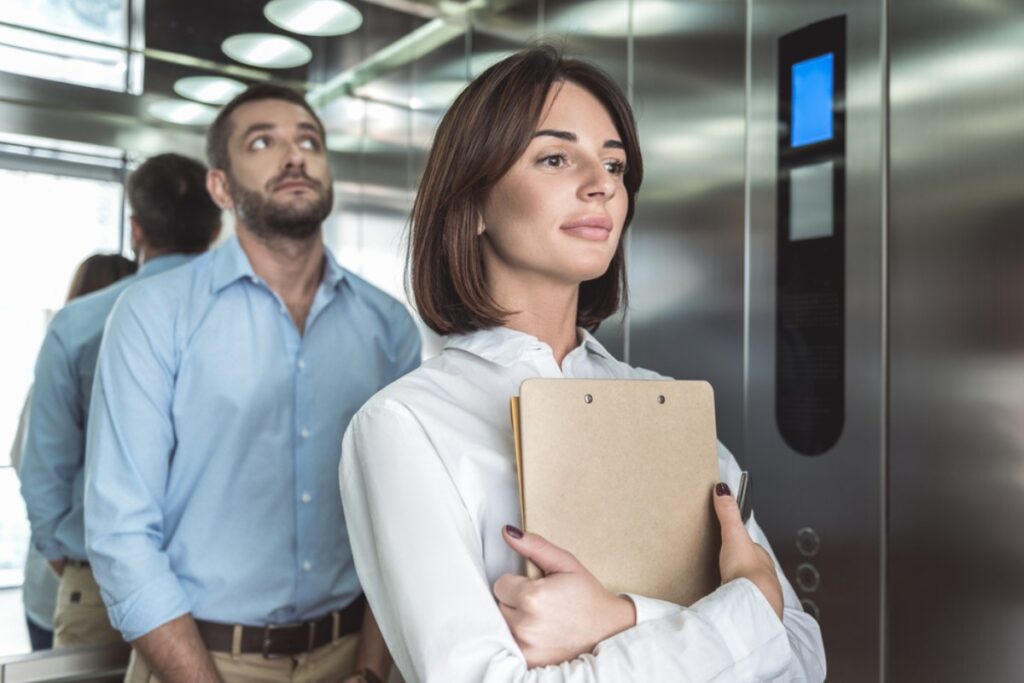
When you step into an elevator, looking straight ahead can feel awkward. You might find yourself staring at the floor or ceiling instead.
But this can actually make the ride feel even more uncomfortable. Others may notice and wonder why you’re avoiding them.
Staring at the floor or ceiling also makes the small space feel quieter and more tense. Sometimes, just a quick smile or nod is enough to ease the tension without saying a word.
If you want to avoid awkwardness, try keeping your gaze neutral or glance around gently. This shows you are present but not trying to start a conversation.
Avoiding eye contact completely
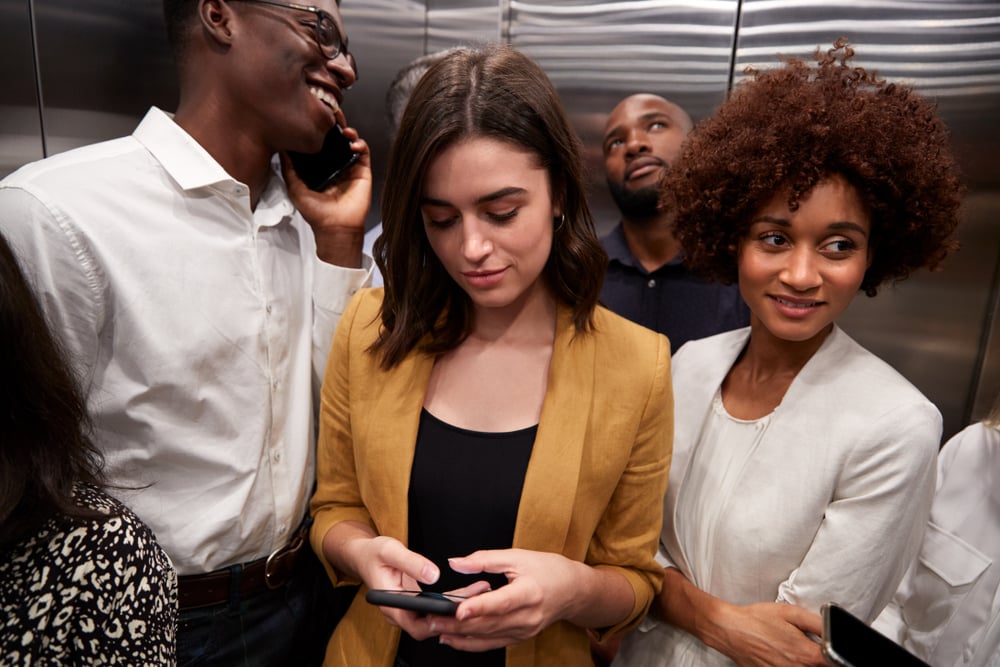
You might feel the urge to avoid looking at anyone in the elevator. It can seem like the easiest way to keep things simple.
But not making any eye contact at all can sometimes make things even more uncomfortable. It might give the impression that you don’t want to share the space or connect, even in a small way.
A quick glance, a nod, or a brief smile can help. These small gestures show you acknowledge others without making things weird.
If you accidentally catch someone’s eye, just look away gently. Staring or locking eyes for too long can lead to awkward feelings.
Counting down floors out loud
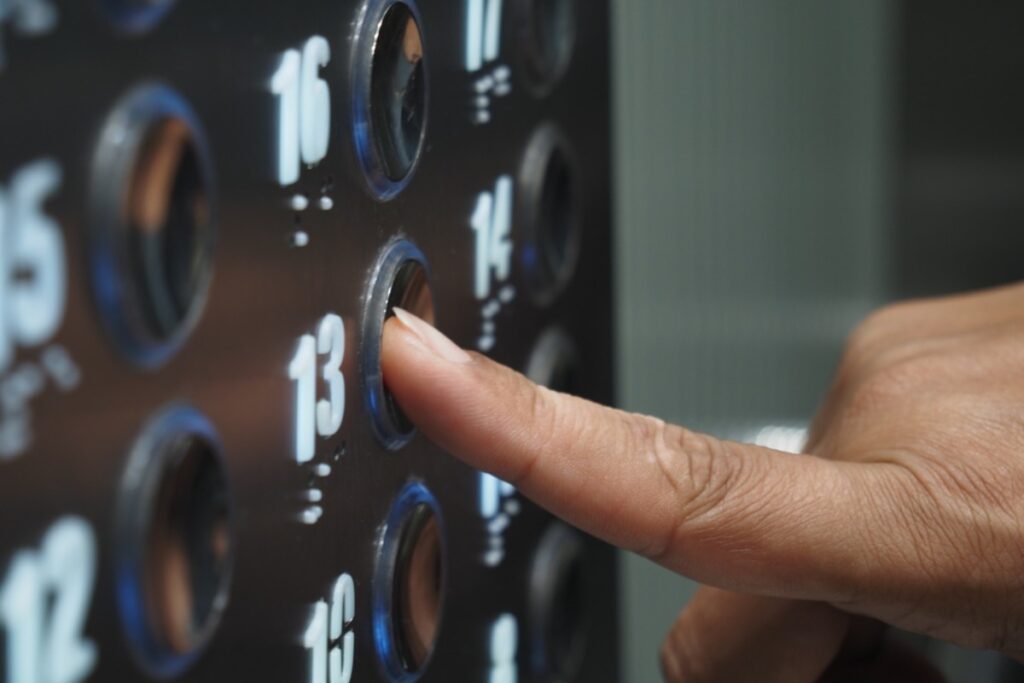
Counting floors out loud might seem harmless, but it can make things awkward fast. Announcing each floor draws attention to the small space you’re all sharing.
People may start feeling uncomfortable or like their privacy is being invaded. Everyone’s there for the same reason—to get to their floor as quickly as possible.
If you want to break the silence, try a quiet smile or a friendly nod instead. Otherwise, keeping quiet about the floors can help everyone enjoy a peaceful ride.
Whispering secrets to a stranger
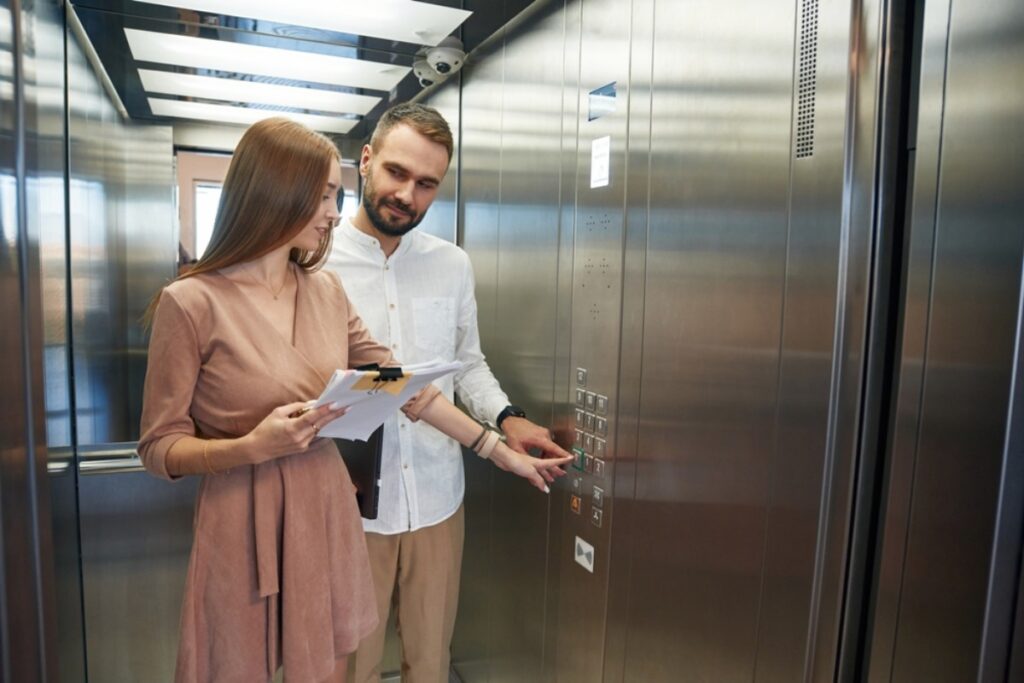
Sharing a secret in an elevator can make the ride really uncomfortable. Whispering personal things to someone you barely know can catch people off guard.
Elevators are small spaces where strangers stand close. When you start talking quietly about private topics, it breaks the usual silence.
If you want to chat, stick to light or neutral topics. Whispering secrets makes the atmosphere tense.
Most people prefer to keep their private stories for friends, not random elevator rides.
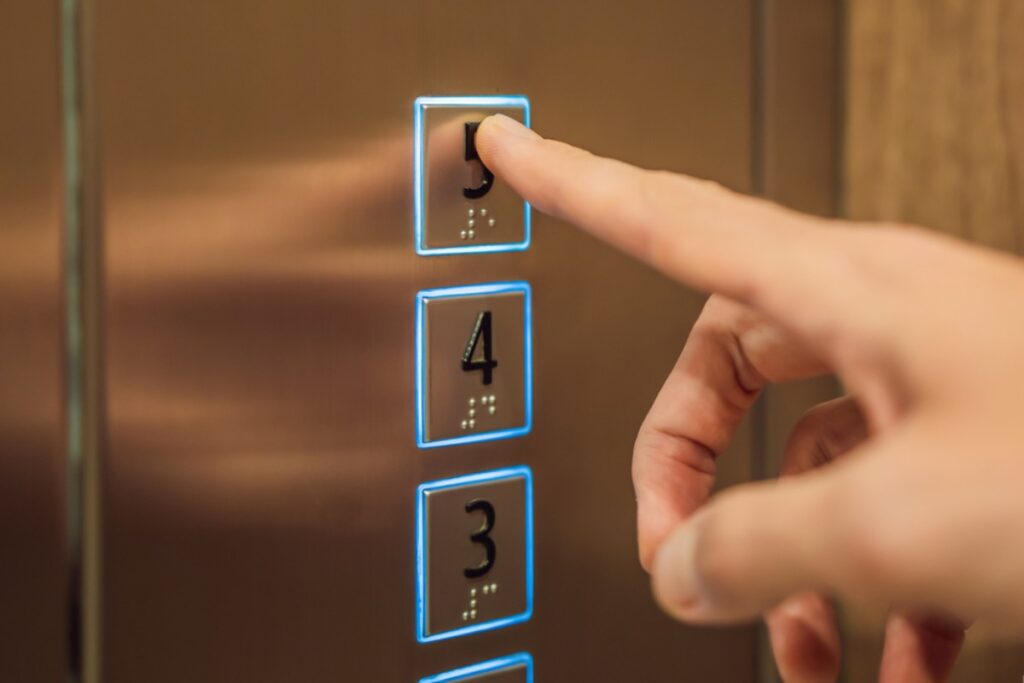
Pressing all the elevator buttons can annoy everyone inside. The elevator will stop on every floor, making the trip much longer than it needs to be.
Sometimes, people press the same button over and over, like the call button or close door button. Doing this doesn’t make the elevator go faster.
If you’re in a hurry, it’s better to press the close door button once and wait patiently. Pushing multiple buttons or pressing the same one many times doesn’t help.
Singing or humming awkwardly

You might start humming a song in an elevator without realizing it. It can feel like a way to pass the time or ease the quiet.
But if someone else is there, it might make things a bit strange. Singing out loud in a small space can make people uncomfortable.
They might wonder if you expect them to join in or if you just don’t realize how loud you are. The silence after the song often feels louder than the singing itself.
Making exaggerated yawns

Yawning loudly and stretching your mouth wide in a small elevator can make others feel uncomfortable. It draws a lot of attention and breaks the quiet space many people prefer.
If you do it again and again, it might look like you are trying to show off or get a reaction. People may wonder why you’re being so dramatic in such a small, shared space.
Instead of exaggerating a yawn, try to keep it quiet and polite. That way, you respect others while still showing you’re a bit tired or bored.
Breaking the silence with random questions
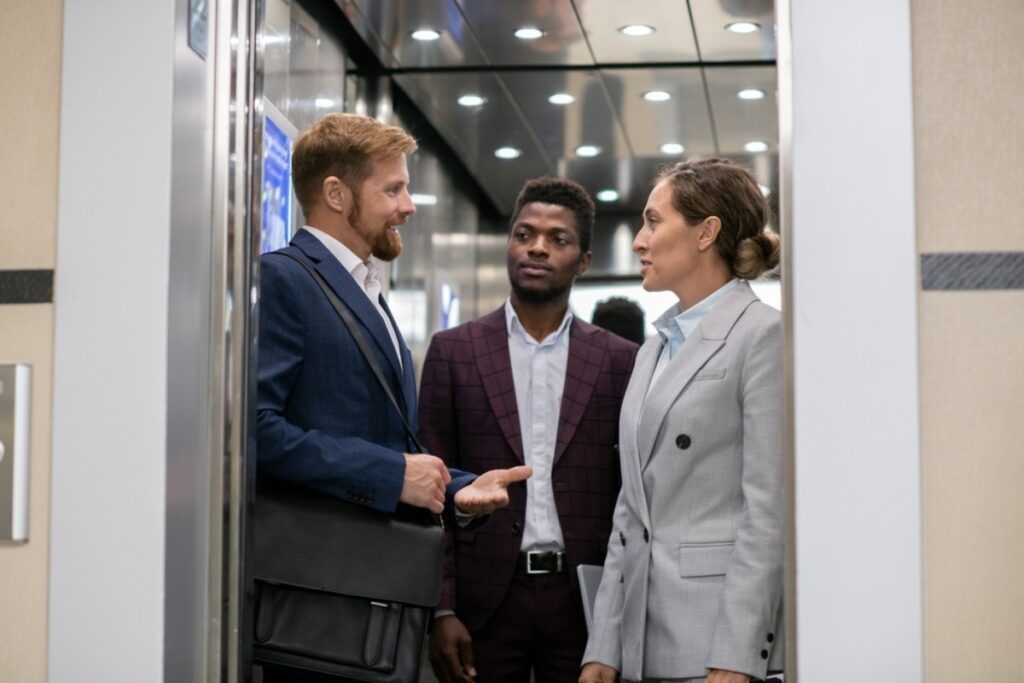
When the elevator feels too quiet, you might want to ask a simple question to start a chat. A small, easy question can help everyone feel more comfortable.
You could ask about something light, like the weather or if they have plans for the day. These kinds of questions are safe and can lead to more relaxed conversation.
Sometimes, a random or fun question works well. It can make the ride less awkward and even bring a smile to someone’s face.
Remember, keep the questions short and easy to answer. The goal is to fill silence, not create new awkwardness.
Checking your phone but glancing up nervously
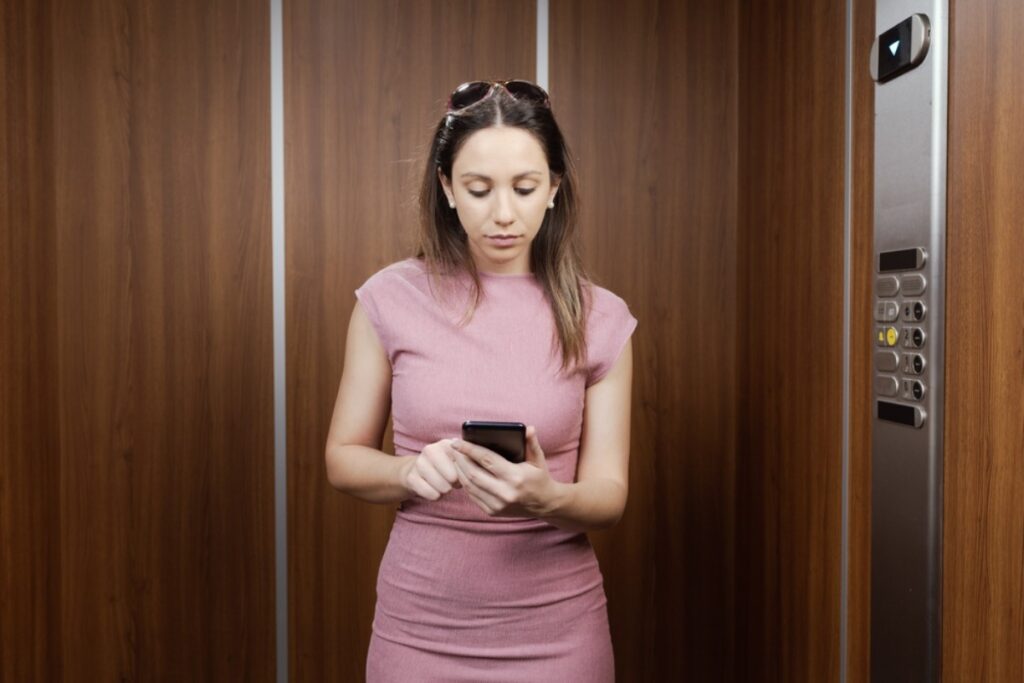
Pulling out your phone in the elevator feels like the safest move. It gives you something to do and helps avoid awkward eye contact.
But if you keep looking up nervously, it shows you’re not fully relaxed. Maybe you worry the person next to you will notice that you’re avoiding them.
This quick glance up can make things feel even more tense. It’s like you want to be distracted but still want to check if someone is watching you.
Sometimes, putting your phone away and just standing quietly can feel just as uncomfortable. Yet, it’s a good chance to get used to brief silence without distractions.
Standing way too close or way too far

When someone stands too close to you in an elevator, it can feel uncomfortable. Your personal space feels crowded, and it’s hard to relax.
On the other hand, standing too far away can also cause weird feelings. If you are too far from others, it can make the space feel empty and a bit tense.
If your face is pointed forward and neutral, people nearby might not mind close space for a short time. But if someone turns their back to the elevator door or faces you too directly, it can feel confrontational.
Sometimes, people don’t notice how close or far they stand. If you shift or step away, others might just move closer again.
Trying to hold a conversation about personal topics

You might feel tempted to chat about personal stuff when the elevator ride feels long. But elevators are small, shared spaces, and personal topics can make others uncomfortable.
If you start asking detailed questions or sharing too much, people may feel like their privacy is being invaded. Most rides last just a few seconds, so there’s usually no need to dive deep into personal stories.
Keeping the talk light and casual helps everyone feel more at ease. Try commenting on something neutral, like the weather or a shared event nearby.
Using the emergency phone for fake calls
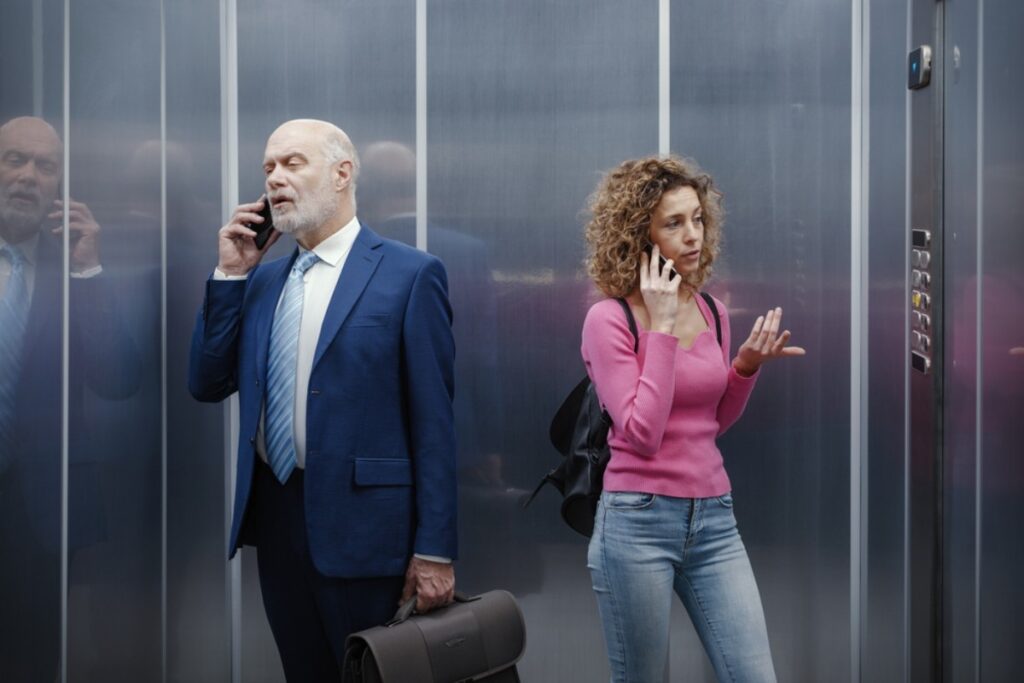
Using the emergency phone in an elevator should be for real emergencies only. Sometimes, people press the button to make fake calls just to be funny or get attention.
When you use the phone for fake calls, it takes time away from people who truly need help. Emergency responders might be delayed because they are busy answering your prank call.
Elevator phones often connect to special service centers or 911. Making false calls is taken seriously and can lead to fines or other penalties.
If you ever feel tempted to use the phone just for fun, remember it’s not a game. It’s there to keep everyone safe when they are stuck or in danger.
Pulling faces or making weird noises

You’ve probably seen someone make a funny face or strange noise in an elevator. It can catch you off guard, especially when everyone is trying to stay quiet.
Pulling faces or making noises breaks the usual silence and can make the ride uncomfortable. Sometimes, people do this to be silly or get a reaction.
You might hear someone making racecar sounds or whistling a tune. While it’s meant to be funny, not everyone appreciates the unexpected attention.
Elevators are small spaces, so small actions feel much bigger to those around you. Not everyone wants to be part of the fun, so use your judgment.
Announcing “I own this elevator” sarcastically

You step into the elevator and suddenly act like you run the place. You press the buttons loudly and stare at everyone like you’re the boss.
Sometimes you say things like, “After me, of course,” or, “This is my favorite elevator.” People hear the sarcasm but still don’t know how to respond.
Trying to control the space in an elevator doesn’t make you look confident. It often makes others want to avoid eye contact or move away.
Tapping someone on the shoulder and denying it

Tapping someone on the shoulder to get their attention should be done carefully and politely. Some people don’t like being touched, even lightly.
If you do tap, be honest about it. Pretending you didn’t can come off as rude or dismissive.
Elevators are small spaces where people want to feel comfortable. Being respectful about personal space helps keep the ride calm.







